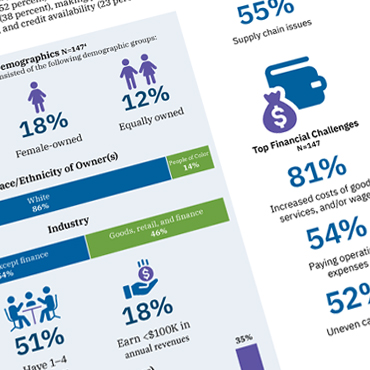
Small businesses1 are a vital part of the American economy, providing a driving force for job creation.2 According to the US Small Business Administration, small businesses employ 45.9 percent of all US employees—approximately 61.6 million people—and make up 99.9 percent of all US businesses.3 With the Federal Reserve Bank of Atlanta's priority on economic mobility & resilience (#EveryonesEconomy), understanding small business conditions and anticipated performance remain an important part of the Community and Economic Development team's work.
The Federal Reserve's Small Business Credit Survey (SBCS) is a national sample of small businesses, or firms with fewer than 500 employees, aimed at providing insights into firms' needs and experiences with financing and debt. The Federal Reserve Banks conducted the 2023 SBCS from September through November 2023 and reached more than 6,000 small employer firms nationwide. The profiles shared below summarize key information from the 2024 Report on Employer Firms: Findings from the 2023 Small Business Credit Survey, with a focus on small businesses in the Sixth Federal Reserve District.4 These six short, infographic fact sheets offer a view into small business conditions in several southeastern areas, including statewide analysis for Alabama, Florida, Georgia, along with data for the Atlanta–Sandy Springs–Roswell metropolitan statistical area (MSA), the Miami–Fort Lauderdale–West Palm Beach MSA, and the Tampa–St. Petersburg–Clearwater MSA.5 The profiles illustrate how respondents in the Sixth District described:
- their overall financial condition;
- the type of business financing sought; and,
- their top financial and operational challenges.
Among all six geographies covered in these briefs, the top three operational challenges small businesses identified in 2023 were reaching customers/growing sales, hiring or retaining qualified staff, and supply chain issues.
The SBCS captures and amplifies the experiences of small businesses and brings them to the attention of service providers, lenders, and policymakers. Join our effort and take the 2024 Small Business Credit Survey by November 1 to share your insights on small business conditions and help us foster an economy that works for all.
By Mary Hirt, CED policy specialist, Shruti Nemala, CED intern, Aaliyah Price, CED analyst, and Alvaro Sanchez, CED senior analyst. The views expressed here are those of the authors and not necessarily those of the Federal Reserve Bank of Atlanta or the Federal Reserve System. Any remaining errors are the authors' responsibility.
1 Whenever we refer to firms, small firms, or small businesses here, we refer to businesses with fewer than 500 employees
2 Karen Mills, “Small Businesses Are Important to the Economy,” Fintech, Small Business & The American Dream (Palgrave Macmillan, 2019), 13-25. DOI 10.1007/978-3-030-03620-1.
3 US Small Business Administration Office of Advocacy, 2023 Small Business Profiles for the States, Territories, and Nation https://advocacy.sba.gov/wp-content/uploads/2023/11/2023-Small-Business-Economic-Profile-US.pdf
4 The Atlanta Fed territory covers the Sixth Federal Reserve District, which includes Alabama, Florida, and Georgia, and portions of Louisiana, Mississippi, and Tennessee.
5 Due to an insufficient number of survey responses we cannot share results for Louisiana, Mississippi, and Tennessee, though they are part of the Federal Reserve Bank of Atlanta's Sixth District. States and MSAs with 100 responses or more are eligible for additional weighted analysis. For more information, see the methodology section in the 2024 Report on Employer Firms.



